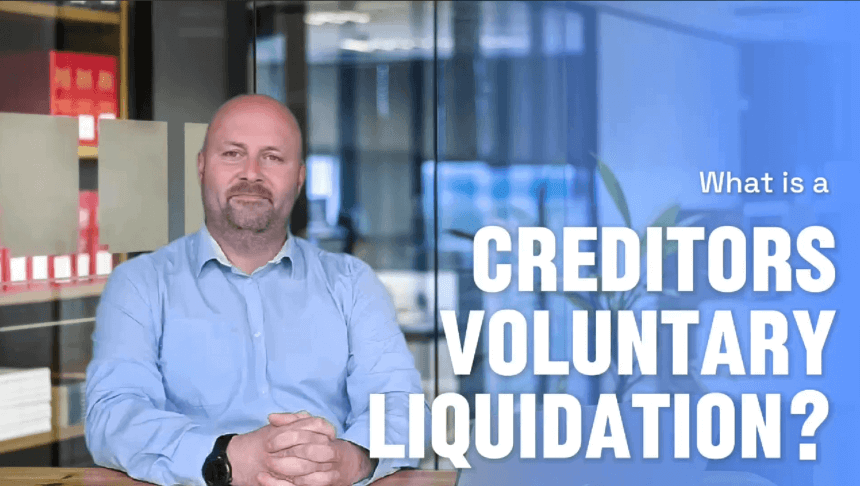
Understand your company's position and learn more about the options available
Require Immediate Support? Free Director Helpline: 0800 644 6080
Free Director Helpline: 0800 644 6080
Updated:
A Creditors’ Voluntary Liquidation – or CVL – is a formal insolvency procedure which brings about the end of an insolvent company. A CVL can only be entered into under the guidance of a licensed insolvency practitioner who will assume the role of liquidator of the company during the process.
A Creditors’ Voluntary Liquidation (CVL) is a formal insolvency procedure whereby the directors of an insolvent company voluntarily choose to close their company.
Although the process is entered into on a voluntary basis, it often follows the cumulation of many months of financial distress when there is no possibility of a successful turnaround.
Even though this is far from an ideal situation, for an insolvent company which has no viable future as a profitable entity going forwards, company liquidation by way of a Creditors' Voluntary Liquidation may be the best solution for all parties.
In many cases a voluntary liquidation by way of a CVL can be funded using the assets of the company which will be sold off as part of the liquidation process meaning directors will not be required to pay the liquidation fees personally.
Free 60 Second Test
For Ltd Company Directors
What are you looking to do?
Choose below:
There are two main tests to determine whether a company is insolvent; the cash flow test, and the balance sheet test.
A company is cash flow insolvent if it cannot afford to meet its debts and other outgoings as and when they fall due; a company which is balance sheet insolvent will have debts greater than the value of its assets. If you believe your company to be insolvent, or believe that it will soon become insolvent, steps must be taken to mitigate the impact this will have on your outstanding creditors.
When a company is insolvent no further credit should be obtained and you should be extremely careful when it comes to making payments to creditors if you do not have sufficient funds to pay everyone you owe. Opting to pay one creditor to the detriment of another may be classed as making a preference payment and you could become personally liable for repayment of such sums if your company is subsequently liquidated. Additionally, any assets or money belonging to the business should be safeguarded and not be sold or otherwise transferred out of the company.
Continuing to trade whilst knowingly insolvent is extremely risky, and you could find yourself being held personally liable for creditor losses incurred during this time. If you believe your company is insolvent, you should seek the advice and services of a licensed Insolvency Practitioner who will be able to talk you through the options available to the company and ensure you remain compliant in your duties as the director of an insolvent company, reducing your risk of wrongful trading or misfeasance.

Get a Quote Find Your Nearest Office
A CVL brings the company to a close and deals with all outstanding company debts as part of the process. While asset realisations will be maximised in order to provide a return to creditors, where a company enters CVL there is likely to be a significant shortfall to creditors, however this will be written off upon the company being liquidated.
The exception to this rule is for company debts which have been personally guaranteed . If you have signed a personal guarantee (PG) responsibility for paying the outstanding amount of this borrowing will remain with you personally and will not be written off.
A CVL should not be confused with Members’ Voluntary Liquidation (MVL) which is a liquidation option for solvent companies whose directors wish to extract funds before bringing the company to a close.
“Called for help with closing non-trading companies and Chelsea advised me on what to do and instead of taking advantage as others would by taking on the case and charging loads. She gave me a solution that would cost £20. Very pleased with the service and thankful for Chelsea’s advice.”
AB
A CVL can only be entered into under the guidance of a licensed Insolvency Practitioner. While in a CVL, the insolvency practitioner will be responsible for liaising with creditors, providing them with a Statement of Affairs, identifying company assets, and distributing any proceeds to creditors. They will also arrange for your company to be dissolved at Companies House at the end of the liquidation process.
An Insolvency Practitioner will be able to give you the sound, practical advice you need when dealing with a distressed company and you are highly encouraged to speak to one at the earliest signs of insolvency. They will be able to discuss the various options available to you and your company which may involve rescue and restructuring procedures such as Administration or a CVA.
However, should the business be beyond rescue, or it is the preference of the directors and shareholders to close the company for good, a Creditors' Voluntary Liquidation is likely to be the most appropriate course of action.
Mounting creditor pressure?
If your creditors are growing increasingly impatient, it is time to take action. Ignoring the situation is only likely to make it worse. Take the first step today by contacting Real Business Rescue for immediate help and advice.
The team are available now - 0800 644 6080
Once the directors have taken the advice of a licensed Insolvency Practitioner and have decided to begin the voluntary liquidation process, they hold a meeting of the board or directors, or in the case of a sole director document a decision of a sole director, resolving to convene a general meeting of shareholders and a decision of creditors to place the company into liquidation (“Decision Date”).
It is at this point that the directors formally instruct a licensed Insolvency Practitioner to oversee the liquidation process and draft the relevant documentation, including a Statement of Affairs.
Following the decision of the director(s) to commence the voluntary liquidation process, shareholders and creditors will be notified of the general meeting and Decision Date respectively.
Prior to the Decision Date, creditors will be presented the a Statement of Affairs of the company. This is a document which sets out the financial position of the company, detailing its assets and liabilities, providing estimated realisable values of company assets, and the estimated deficiency to creditors.
In addition a report is prepared by the Insolvency Practitioner providing a brief trading history, extracts from the company’s recent accounts and a deficiency account, detailing financial movements and assumed financial movements between the date of the last accounts and the date of liquidation. This report and the statement of affairs must be made available to creditors the day before the Decision Date, at the latest.

Our Confidential Test will help your understand your:
Plus much more ...
60 Second Test
The general meeting of shareholders and Decision Date of Creditors will usually take place on the same day. In order for the company to enter liquidation at least 75% of shareholders must resolve to wind the Company up.
The Liquidation commences at 23:59 on the Decision Date, with the appointment of the liquidators being deemed approved. This can be conducted remotely with the director(s), which removes an element of stress from the process.
During the liquidation of the company the Insolvency Practitioner will continue to liaise with creditors, resolve any issues related to creditor claims, and take the appropriate actions necessary to realise the company assets so that the proceeds can be used to distribute to outstanding creditors.
All assets will be independently valued, marketed and sold as appropriate. It is possible for the directors of the insolvent company to purchase assets of the company, as long as this sale is negotiated through the Insolvency Practitioner and they are purchased at market value.
The Insolvency Practitioner will also be responsible for collecting outstanding book debts, handling employee claims, issuing the necessary reports to government agencies, and distributing available funds to creditors. There is a set order of priority laid out in the Insolvency Act 1986 which must be followed when funds are being allocated to creditors. Secured creditors with a fixed charge are first in line for payment, followed by preferential creditors (including staff due arrears of wages), and then secured creditors with a floating charge (subject to any deductions for the Prescribed Part).
Unsecured creditors, such as suppliers and customers are next in the pecking order, although unfortunately at this stage there is unlikely to be sufficient remaining funds to allow for significant returns to be made.
Upon completion of the liquidation, the company will be struck off the register held at Companies House and the company will cease to exist. Any liabilities which remain unpaid by the company will be written off, unless they were personally guaranteed.
As part of the process, the liquidator is required to investigate any actions taken by the directors (and former directors within the last 3 years). If it is found that they did not fulfil their fiduciary duties while knowingly insolvent, or conducted transactions which were to the detriment of creditors and challengeable, they may be found guilty of wrongful trading, fraudulent trading or misfeasance.
This could result in the directors being held personally liable for some or all of the company’s debts, and they may be disqualified from acting as the director of any company for a period of up to 15 years. However, this is extremely rare and in the vast majority of cases, and directors are free to move on and even set up another business if they so wish.
Need to speak to someone?
If your company is struggling with unmanageable debts, squeezed cash flow, or an uncertain future, you are far from alone. We speak to company directors just like you every single day, and we are here to give you the help and advice you need.
Call our team today on 0800 644 6080
Call us today to arrange a free consultation and find out how we can help you and your company navigate its way out of distress. Whether your aim is to rescue the business, or alternatively if you are looking at ways to wind up your company on a voluntary basis, we can help. With 100+ offices across the country Real Business Rescue can offer unparalleled director advice no matter where in the UK you are based.
Still unsure whether liquidation is right for your company? Don't worry, the experts at Real Business Rescue are here to help. Our licensed insolvency practitioners will take the time to understand the problems your company is facing before recommending the best course of action going forward based on your own unique circumstances.

Complete the below to get in touch
For Ltd Company Directors
What are you looking to do?
Choose below:
We provide free confidential advice with absolutely no obligation.
Our expert and non-judgemental team are ready to assist directors and stakeholders today.

Understand your company's position and learn more about the options available

Find your nearest office - we have more than 100 across the UK. Remote Video Meetings are also available.

Free, confidential, and trusted advice for company directors across the UK.